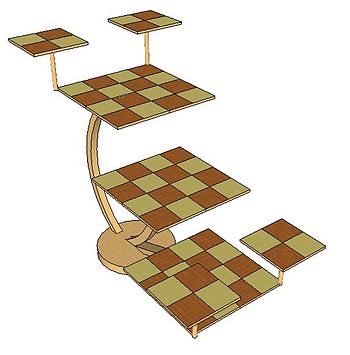_______________________________________
 |
| Image found publicly on Facebook |
would never - imagine finding herself. Sure, when she bought her gun it was with the thought that it was for self-protection - but it was a distant thought, one that didn't comport real conviction. Now here she was loading her ten precious silver bullets into her magazine, sliding it into place, ready to take out the werewolf pacing outside her bedroom door.
In your fictional work, laws don't just go away. You will need to research the area in which your heroine lives and have her come to some decisions about her own conduct. In Janet Evanoviche's Stephanie Plum series, Plum disobeys the law by carrying a concealed gun - that she has no intention of shooting or even brandishing. Plum relies on the fact that she has dumb-luck (and a hunky police investigator boyfriend) on her side to keep out of jail.
What choices will your heroine make?
Legal or Illegal? How does your heroine get a gun in her hand?
* If she is buying a gun she must fill out BATF form 4473.
This form includes information about the buyer, the serial
number, and a description of the firearm. (Not applicable to
private sales - obviously, if your heroine is getting it from
Crud Murphy in the back alley, she won't be filling out a form)
* There are legal reasons why your heroine may not be able to
follow the straight and narrow. It is illegal for her to buy a gun if
she :
^ Was convicted of domestic violence
^ Has ever had a court ordered restraint
^ Was a United States Citizens then renounced their
citizenship.
^ Was discharged from the armed forces dishonorably
^ Is addicted to a controlled substance
^ Is illegally in the U.S.
^ Is fugitive from the law
^ Was convicted of or under indictment for a crime that carries
over a year in jail.
Legally possessing and legally transporting a gun are two different things.
* Federal law prohibits guns in federal buildings such aspost offices, some military installations, some public lands.
* The area your heroine lives will determine if she can open carry,
conceal carry, whether she can only have her gun in her home or
if she can have it in her yard/on her property.
* Gun safety laws are important to how you lay out your plot line.
If your heroine's jurisdiction requires her to have a gun lock - can
she get access to it in time? Especially under high-stress
circumstances? Remember that violent acts usually happen close
and quick. Did she prepare for that by having her bedroom set up
like a safe room with steel doors? Does she decide to ignore the
law and keep the gun under her pillow? You might just have her
shoot the serial killer and have her butt dragged to jail. Isn't that
an interesting twist?
 |
| Image found publicly on Facebook |
The Use of Deadly Force in Self Defense
The "Reasonable Man" Standard - What would a reasonable man (or heroine) do in a given situation. This is the standard that is placed before a jury. What seems reasonable to a person in the heat of the moment - with tunnel vision and other physiological and psychological factors running amok - may not seem so reasonable to those 12 who are rendering a verdict.
Reasonable Force - The amount of force your heroine uses to defend herself can't exceed what is called for to get out of the situation. If the heroine hit the guy on the noggin with her fry pan, she can't pull out her gun and shoot the unconscious villain in the head to have it over with. While she may feel it's a reasonable response after all the heartache he's caused her, the courts would disagree.
Use of Deadly Force
 |
| Image found publicly on Facebook |
Brandishing - Is when your heroine displays her firearm in a threatening or aggressive manner; this action is illegal for the most part. Let's assume for a minute that your heroine is confronted by her crazy ex who hisses in her ear, "I'm coming after you. I'll toy with you then kill you and laugh as I burn your body." YIPES! Your heroine cannot pull out her gun and point it at him and say, "I'll be waiting." 1) that's brandishing and 2) that's provoking which means that if he does come after her, she is not an innocent party. So if anyone heard that exchange, she's in deep doo-doo if his body is splayed across her kitchen floor.
Castle Doctrine - "a man's home is his castle" and he has every right to defend it. This is the law in many jurisdictions such as Texas. In your home you are not required to retreat from an attacker. Also, in some places this law protects you wherever you are staying such as a hotel or friend's house.
Cessation of Threat - Your heroine is entitled to use deadly force against the attacker as long as she is still being threatened. If the zombie fled, surrendered, or collapsed in a pile of entrails, lethal force must stop.
So Your Heroine Shot the Bad Guy, Now What?
* In all jurisdictions if a shooting results in injury or death it will be
investigated by the police.
* Anything your heroine says can be used against her
* She has the right to be quiet - though she may not have the right
mental state to exercise her right. But sometimes less is more
until she talks to her attorney. Yes, she is going to need one.
* If your heroine knew the person or quarreled with the person
even if she was protecting herself - she may have acted illegally.
(though many will say they'd rather be tried by 12 then carried by
6) your heroine needs to think about that in advance and take
precautions. In the trial was her only precaution to buy a gun and
take one-on-one classes in quick draw? Uh-oh. Putting in a
security system, getting a dog, putting up lights, filing for a
restraining order all of the OTHER steps she took to harden her
surrounding against attack will go in her favor.
* Your heroine is not going to get a pat on the back and a
handkerchief handed to her. She will probably be arrested,
booked, fingerprinted, and photographed. She will be put in a
cell where she will wait until charges are dropped or bail posted.
This could take several days.
* The police may take the heroine's gun and any other gun in the
house since she is a suspect in a homicide (or if the villain lives
she will have committed assault with a deadly weapon). And if
the villain lives, his side of the story might be vastly different
than your heroine's. (ballistic forensics LINK)
* They will probably fire her guns for ballistic impressions if they
are trying to make a case against her.
* An area where a shooting took place may (probably will be)
treated as a crime scene. As the police run through their normal
evidence collection (crime scene 101 information), they will
cordon off the area and only the police will have access. This can
go on for days or even weeks. Does your heroine have someplace
else to stay?
* If your heroine carries in a state that requires a gun permit, she
may have that permit suspended. Uh-oh. She killed the villain
and now his brothers are after her in retribution. Now what
choices is she going to make?
* Criminal Trial - is possible
* Civil Suit is almost inevitable - as the family steps forward and
tries to sue your heroine for killing their sweet baby. Just the
legal bills will be thousands. (Check state law.)
I hope everything turns out great for your heroine and she gets to live happily ever after.
As always, this is a non-political site that is geared to help writers write it right. I am presenting information to help develop fictional characters and fictional scenes. In no way am I advocating any position or personal decision.
Information for this blog article comes from NRA Guide to the Basics of Personal Protection in the Home, (2000) National Rifle Association of America




























